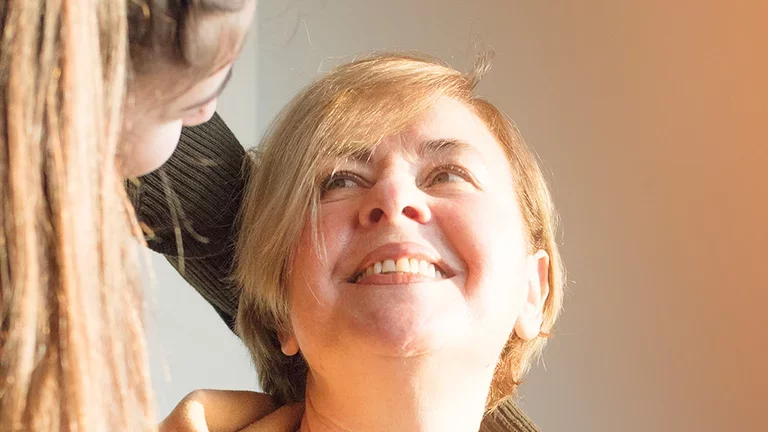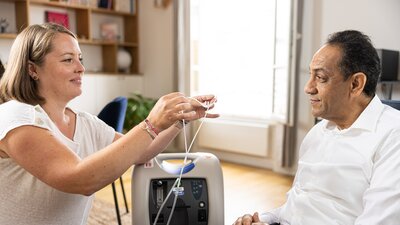Parkinson's disease: crossed views on the management of the pathology
Published on April 12, 2021
4 minutes

160,000 people in France suffer from Parkinson’s disease. That’s one in a hundred people over the age of 65. The figures are expected to double by 2050. Parkinson’s is an automaticity disorder characterized by slowness of movement, rigidity, and sometimes tremors when at rest. Professor David Devos, neurologist and pharmacologist at Lille University Hospital, joins a nursing consultant for the home healthcare provider ORKYN’, to discuss the necessary and beneficial collaboration among healthcare professionals to improve the daily lives of patients and their carers.
What is the role of at-home healthcare providers in caring for patients suffering from Parkinson’s disease?
David Devos: A patient consults with a neurologist approximately every three to nine months. The frequency depends on the therapeutic needs of the patient and the advancement of the illness. However, the situation can deteriorate between appointments, and the patient’s quality of life declines with it. That is why we need qualified personnel who can report on our patients’ conditions. At-home healthcare providers relay information to the different professionals caring for the patient in order to best treat the patient and follow up on their condition.
Nursing consultant: Yes, the reporting role is essential: we provide a connection between the patient’s home life and the hospital. We explain, we clarify, we train, and most importantly we accompany patients with regular follow-ups, generally every three months in the absence of complications. We have a special relationship with patients and their families. The course of healthcare can sometimes be complicated in these illnesses, depending on whether the patient lives in the city or countryside. They sometimes feel isolated. We act as a support system and a source of information, bringing them security and improving their quality of life.
What do service providers bring to the course of healthcare?
David Devos: We work as a team, and everyone’s contributions are useful. For us as neurologists, it is convenient to get reports. It reassures us to be able to count on an organization that can alert us within a time limit that we could not otherwise have had with our patients. It is a safety net for our patients, and for us too. An efficient city/hospital network seems essential to me, and it is the future! But from the patient’s point of view, it is the human aspect that is most important. If you ask them, you understand that it’s not just about treatment: it’s about feeling accompanied, monitored and listened to that makes all the difference.
Nursing consultant: We listen to patients and reassure them. We encourage them in their progress, and we explain the treatment to them, but we are especially present with them. Some individuals deal with their illness on their own; others might have carers, but those carers can be overwhelmed. We don’t have all the answers. We remain within our roles as at-home healthcare providers. But we act as bridges, and we know when it is time to get experts involved to make the course of healthcare more effective.
How can the course of healthcare be improved for Parkinson’s disease?
David Devos: In order for a carer to contribute to the course of healthcare, that person must be qualified to evaluate the patient on a regular basis. When a patient consults with us, we only get a snapshot of the individual’s health at that precise moment. However, in pathologies such as Parkinson’s disease, the patient’s condition fluctuates from day to day. The most valuable assessment is one that can be made in real-life conditions. That means at home, by a qualified health care professional. A tool such as an actigraph provides precious data that we use to adapt the treatment, optimize its benefits, and improve the quality of life. An actimetry unit is a medical device which is worn like a watch. It records each movement that the patient makes: a blockage, a tremor, or an unusually slow movement. We might have the patient wear one for several days to get a reliable idea of whether the treatment is sufficient with regard to the motor ability that we observe in consultation.
Nursing consultant: That is a tool that we use, particularly before putting a pump in. It provides reference information with which we can make comparisons a few months later. The device plays an important role in educating the patient and their loved ones. It makes it possible to demonstrate improvements, to point out the benefits of treatment, and to place the illness – not just symptoms – in context. It is a complement to our at-home visit reporting, and it enables us to share very precise information with the doctor.


